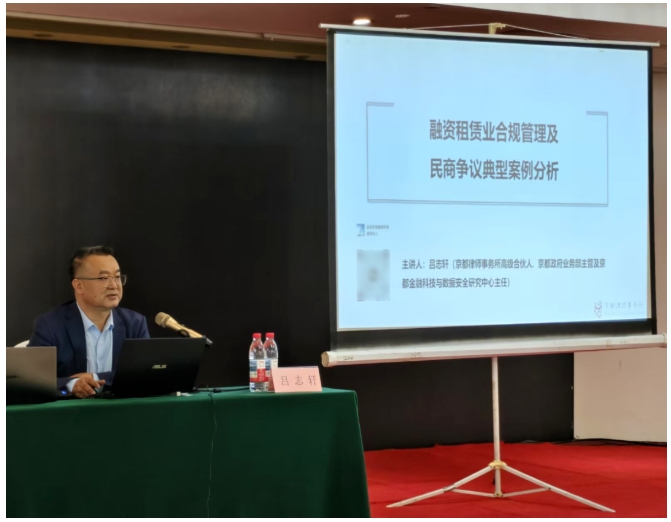On May 16, 2025, Mr. Lyu Zhixuan, a senior partner at Beijing Juyou Law Firm, was invited by the Beijing Leasing Association to conduct a legal compliance training session for association members on the topic of “Compliance Management in the Financial Leasing Industry and Analysis of Typical Civil and Commercial Dispute Cases.” The event was organized by the Beijing Leasing Industry Association with the aim of assisting financial leasing companies in compliance management, enhancing their operational capabilities, and promoting high-quality development in the financial leasing industry.

Attorney Lu Zhixuan has extensive experience in financial and financial regulatory compliance law, having accumulated rich practical experience in compliance over the years. Drawing on detailed case studies, he provided an in-depth interpretation and analysis of the business classification and regulatory legal policies applicable to leasing companies, and provided a detailed introduction to business models such as direct leasing, sale-and-lease-back, and operational leasing. He emphasized the importance of leasing companies legally obtaining ownership of leased assets and reminded enterprises to avoid crossing the red line of illegal financial activities. Additionally, he elaborated on the current national policies supporting the leasing industry, highlighting how these policies empower leasing companies to transition toward technology-driven finance and green, low-carbon development. He also pointed out that companies should focus on five key development directions: technology-driven finance, green finance, inclusive finance, elderly care finance, and digital finance.

In terms of business compliance management, Attorney Lü Zhixuan analyzed common issues identified during on-site inspections over the years and provided detailed compliance recommendations for enterprises. He emphasized the need for enterprises to establish sound internal control systems and risk management frameworks, ensure clear ownership of leased assets, monitor fund flows, and prevent various non-compliant risks.
He also delved into the definition of the scope of leasing business and the criteria for eligible leased assets. He pointed out that leased assets must be genuinely existent, possess usability and marketability, and meet specific requirements.
Finally, Attorney Lü Zixuan shared with participating members multiple administrative violation cases in the leasing industry, civil and commercial contract dispute cases, and judicial practice rulings on the determination of fictitious leased assets, as well as the validity of contracts involving real estate or intangible assets as leased assets. He reminded businesses that in operating financial leasing, they must ensure the actual existence and lawful ownership of the leased assets, adhere to the principle of combining “financing” with “asset leasing,” and avoid issues such as unclear ownership of leased assets or situations where “financial leasing is in name only, but in fact amounts to lending,” which could render the financial leasing contract invalid and result in losses for the business.
The training session was comprehensive and rich in case studies, providing an in-depth analysis of legal risks and compliance requirements in the leasing industry. The discussion was lively, with active participation from attendees. Through this training, businesses gained a deeper understanding of compliance and regulatory requirements in the leasing industry, enhancing their compliance management capabilities and providing a solid foundation for fostering new productive forces and promoting high-quality development in the leasing industry.




